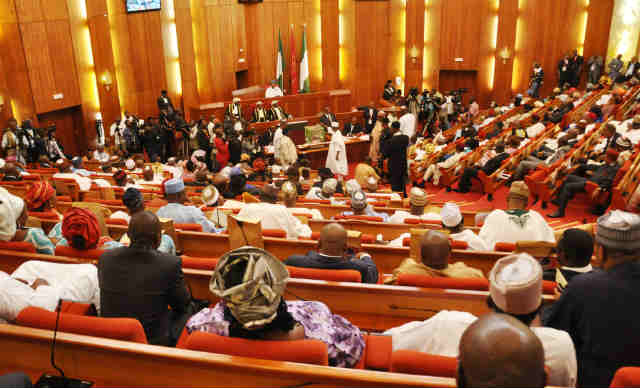 The Senate President, Dr. Bukola Saraki as an avid user of modern technology and new media platforms knows what advantage the online community serves to the members of the 8th assembly.
The Senate President, Dr. Bukola Saraki as an avid user of modern technology and new media platforms knows what advantage the online community serves to the members of the 8th assembly.
Participatory governance in solving our national problems involves slow, difficult negotiations to seek agreement among the three tiers of Government and the citizens. With this, the use of social media puts legislators, organizations, citizens and journalists in touch with each other through simple Question and Answer processes that are facilitated by the use of Internet.
Lawmaking, oversight over the executive, budget appropriations and representation are the major functions performed by the parliament. In performing these functions, they majorly serve the categories of the stakeholders, the public, members of parliament (MPs), and staff. In addition to these stakeholders, various government institutions and independent institutions such as councils, ministries etc interact with parliament on regular basis. All these stakeholders have different needs at different level of intensity.
With the advancement of globalisation and technology, parliament is faced with several challenges in terms of providing services to its stakeholders. For example: the public now expects more transparency in parliamentary practices and faster responses to their queries using Internet technology. Here in Nigeria, there have been a strong calls to the Senate President through an online campaign on twitter “#OpenNASS” to make the parliament transparent, accessible and accountable. These calls are the reason the Senate President has set into motion the use of e-parliament (which is the use of information communication technology (ICT) by elected representatives, their members and political and administrative staff, in the conduct of their tasks, actively involving its citizen) in the 8th assembly to bring the electorate more closer to the parliament through the use of various technological tools which are readily available in the hands of million on Nigerians.
The 8th Senate has committed it members of parliament to interact with the people now than ever on anytime, anywhere basis for various informational and collaborative needs. The birth of new media has changed the landscape of information gathering and sharing which has provided people with real-time information even in the comfort of their homes.
The potential benefits of a strong parliament to the electorate and representatives is that it will bring about:
- A transparent parliament that is open to the nation and transparent in the conduct of its business;
- An elected parliament that is socially and politically representative and committed to equal opportunities to both members and the public so that they can carry out their mandates;
- Involvement of the public, including civil society and other people’s movement in the work of the parliament;
- Accountability to members and electorates for their performance in office and for the integrity of their conduct;
- An effective organisation and performance of parliamentary duties in accordance with set rules and values;
- Enables members to form issue networks through which they can assess policy alternatives and choose ideas for joint action in the parliament. This process will involve international parliamentary hearings and conference calls, and polling legislators to set priorities;
- Creation of e-parliament which means the members and public will have access to recent informations, documents related to law-making, oversight and representation through their website(s). It will also provide the means for understanding what the parliament does, who its members are, what they have done and how to communicate with them. Information will be offered in different formats including text, audio, video which enable citizen to find informations quickly and easily.
With these aforementioned benefits, the call for an “#OpenNASS” will be met.
Before this call for OpenNASS, MPs and the public have to rely on ineffective methods to access parliamentary information such as publications of Acts and Amendments of Acts, irregular committee reports and financing sheets. MPs have to submit petition, motion, questions to parliament in person and the only way to monitor an ongoing bill, Motion is by contacting relevant staff.
Everyone involved in policy-making needs good ideas. One good idea can make all the difference. One bad idea can be disastrous. Whether in government or opposition, legislators and political parties all need to be on the cutting edge of policy.
Support InfoStride News' Credible Journalism: Only credible journalism can guarantee a fair, accountable and transparent society, including democracy and government. It involves a lot of efforts and money. We need your support. Click here to Donate
